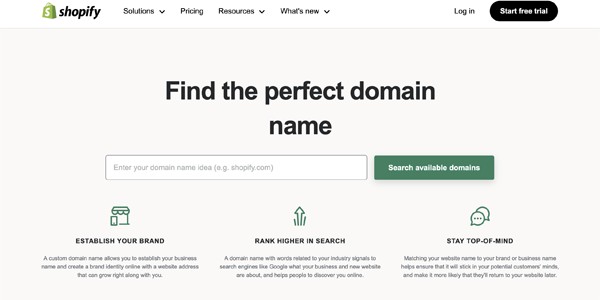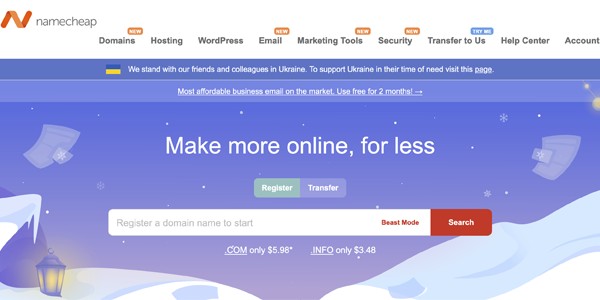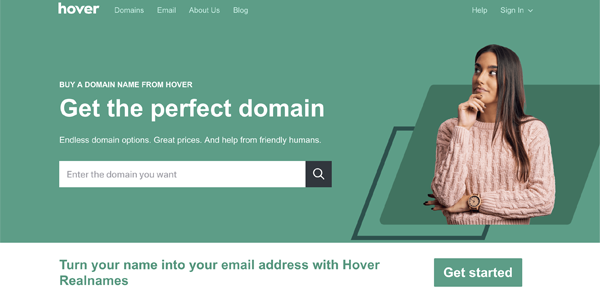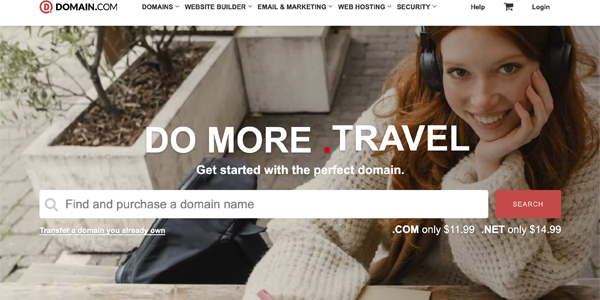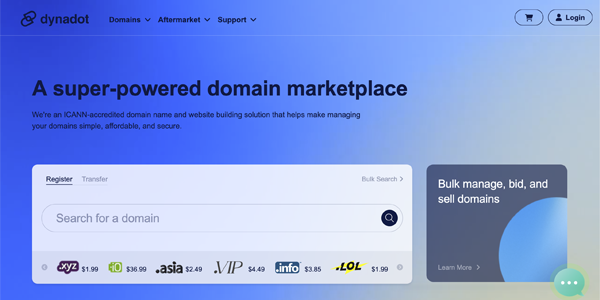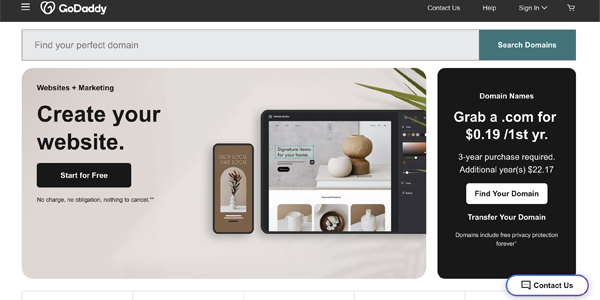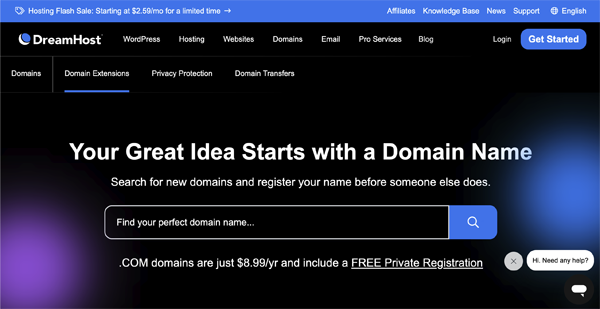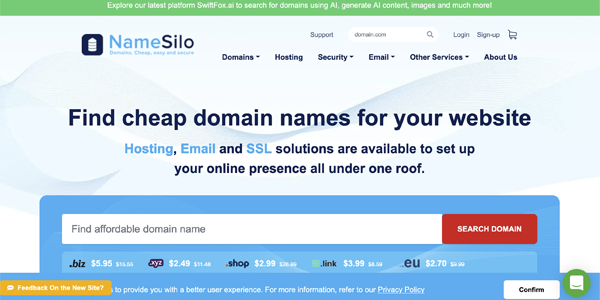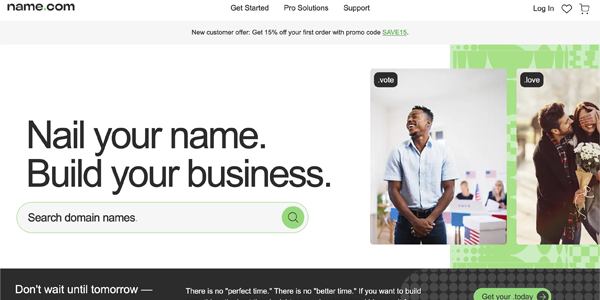Compare 10 best domain registrars at Comparedomain.net. When it comes to securing a domain name for your website, choosing the right domain name registrar is crucial. The options can seem overwhelming, but finding a reputable and reliable registrar is key to ensuring your domain name is properly managed and protected. There are many registrars out there, each with their own set of features and pricing. In this article, we will explore the 10 best domain name registrars that offer a combination of competitive pricing, user-friendly interface, excellent customer support, and a range of additional services to meet your domain name needs. Whether you’re looking for the best value, top-notch security, or a wide selection of domain extensions, these top 10 registrars have got you covered.
1. Shopify
Shopify is the best domain registrar for setting up an online store because of its convenience and fully hosted online store connectivity. With Shopify, you can not only register your domain but also set up your online store without the hassle of managing separate hosting providers. The fully hosted online store feature allows you to focus on building your brand and selling your products without worrying about the technical aspects of hosting and server management.
Additionally, Shopify offers all-in-one commerce and website tools, making it a one-stop solution for all your online store needs. It provides everything from website design and development to payment processing and inventory management. This comprehensive approach streamlines the process of setting up and running an online store, saving you time and effort.
Overall, Shopify stands out as the best domain registrar for online stores due to its convenience, fully hosted online store connectivity, and all-in-one commerce and website tools. If you’re looking for an easy and efficient way to establish your online presence and start selling your products, Shopify is the ideal solution.
Price
Commencing at just $11 per year, our pricing structure ensures transparency and consistency. Renewal prices align with your initial purchase, eliminating any unexpected renewal fees.
Benefits of Choosing Shopify
- Best-in-class ecommerce features: Shopify provides a comprehensive solution for creating an online store. Bundle domain registration seamlessly with web hosting, website design, online shopping functionality, and email.
- Inclusive privacy protection: Enjoy WHOIS privacy protection with every domain registration, eliminating the need for additional fees to secure this additional layer of privacy.
- Effortless domain transfers: Shopify facilitates uncomplicated domain transfers to or from their platform. For eligible domains, the transfer process is straightforward, requiring a minimum ownership period of 60 days. Transferring a domain away from Shopify is a simple task, achievable in just a few clicks from your admin page.
Considerations for Some Users
- Optimized for ecommerce: While Shopify excels in catering to the needs of online store owners, individuals without specific ecommerce requirements may find some features superfluous for their purposes.
2. Namecheap
Namecheap offers domain registration services with a range of features and pricing options. Their reputation for affordability is evident through competitive pricing for domain registrations, with additional discounts available for long-term registrations. Security features such as WhoisGuard privacy protection and two-factor authentication are included in their offerings, ensuring the privacy and security of customers’ domain registrations.
As a company involved in internet advocacy, Namecheap has a history of standing up for internet freedom and against censorship. This commitment to advocacy sets them apart in the domain registration industry.
Pros of Namecheap’s services include their competitive pricing, strong security features, and commitment to internet advocacy. Additionally, they offer a user-friendly interface for domain management and a variety of add-on services. However, some cons include limited website building and hosting options compared to other providers.
Overall, Namecheap’s domain registration services offer a good balance of affordability, security features, and involvement in internet advocacy, making them a strong choice for individuals and businesses looking to register a domain.
Price
Namecheap offers competitive pricing for .com domains, starting at $8.88 per year. Renewal pricing begins at $12.98, with a nominal increase of approximately $4 in the second year compared to the initial amount paid.
Reasons to Choose Namecheap
- Package hosting deal: Namecheap provides a comprehensive package deal that includes domain registration and web hosting. Additional offerings encompass email services, security features such as SSL, VPN, DNS, and dedicated WordPress hosting.
- Privacy included: Enjoy free WhoisGuard protection for all domains registered with Namecheap, safeguarding your personal information on the WHOIS directory. Namecheap also offers optional security features like SSL certificates, VPN services, and PremiumDNS as add-ons to your annual fee.
- Effortless domain transfers: Transferring a domain away from Namecheap is a straightforward process. As long as your domain is over 60 days old and hasn’t been transferred within the last 60 days, you have the flexibility to leave Namecheap. Transferring a domain to Namecheap typically takes between 30 minutes and six days and is cost-effective.
Considerations for Some Users
- Mixed reviews: Customer support may be a concern with Namecheap, as it lacks phone service, utilizes an older ticketing system, and has received feedback about extended wait times for live chat assistance.
3. Hover
Hover offers domain registration with key features such as a user-friendly interface, excellent customer service, and a wide range of domain name options. Their pricing for .com domains starts at $12.99 per year.
The platform is known for its simplicity, making it easy for users to search for and register domain names quickly and efficiently. Additionally, Hover allows users to easily connect their domains to hosting providers, offering seamless integration for website building and management.
Their customer service is highly praised, with a dedicated support team available to assist users with any domain-related issues or questions. The platform also provides various domain name options, including country-specific domains and unique domain extensions, to cater to different business and personal needs.
Overall, Hover offers a straightforward and user-friendly domain registration experience, with competitive pricing and excellent customer service. Their ability to seamlessly connect domains to hosting providers makes them a top choice for individuals and businesses looking to establish a strong online presence.
Price
For .com domains, Hover offers competitive pricing starting at $12.99 per year, with renewals priced around $14.99 per year.
4. Domain.com
Domain.com offers a wide range of key features and pricing options for domain registration. They provide domain registration for various TLDs and country-code domains like .com, .net, .org, .info, .biz, and many more. The initial cost for registering a .com domain is typically around $9.99 for the first year with renewal fees at the regular rate of $13.99 per year.
In addition to domain registration, Domain.com offers bonus features such as professional email, SSL certificates for website security, and SiteLock to protect against malware and security breaches. These bonus features can be added to your domain registration package for an additional cost.
Customer service is a priority at Domain.com, with a focus on catering to beginners. They provide 24/7 customer support via phone, live chat, and email, along with a comprehensive knowledge base and tutorials for those new to domain registration and website management.
Overall, Domain.com offers a comprehensive range of domain registration options, bonus features for added security and professionalism, and excellent customer service for beginners entering the world of website management.
Price
Domain.com offers competitive pricing for .com domains, starting at $9.99 per year with a one-year minimum commitment. Renewals for .com domains are priced at $13.99 per year.
Reasons to Choose Domain.com
- Optional hosting, security, and website building: Enhance your online presence with additional services available at Domain.com, including web hosting starting at $3.75 per month, web design and marketing services, a website builder, business email, and website security such as SSL.
- Easy domain transfer: Domain transfers are straightforward with Domain.com. While the specific cost is revealed upon entering the domain for transfer, it’s recommended to compare prices with other services to ensure competitive rates.
Considerations for Some Users
- Ensure fair pricing: If you opt for Domain.com, it’s advisable to check other services to confirm you’re receiving a competitive and fair price for your domain needs.
5. Dynadot
Dynadot offers a variety of key features and pricing options for domain registration. They provide a wide range of top-level domains (TLDs) including .com, .co, .uk, and .org at affordable prices. For example, the price for a .com domain is $8.99, .co is $22.99, .uk is $8.99, and .org is $8.99.
Additionally, Dynadot also offers transparent and reasonable pricing for domain registration and renewal, with no hidden fees. They also provide free extras such as domain privacy, domain forwarding, and stealth forwarding to enhance the value of their domain services.
Furthermore, Dynadot has domain auctions and backorder options available, allowing customers to acquire valuable domains that are already registered or set to expire. This provides customers with the opportunity to obtain sought-after domains that may not be available through traditional registration.
In summary, Dynadot’s pricing options, variety of TLDs, domain auctions, backorder options, and free extras make it a comprehensive and affordable option for individuals and businesses looking to secure their online presence.
Price
6. GoDaddy
GoDaddy offers domain registration with key features such as a wide range of domain name options including popular TLDs and country-specific extensions, easy domain management tools, and 24/7 customer support. Pricing options vary depending on the specific domain extension and length of registration, with promotional pricing available for the first year.
In terms of SEO support, GoDaddy provides domain forwarding and masking, domain locking to prevent unauthorized transfers, and the ability to update DNS settings. Additionally, GoDaddy offers a domain auction platform where users can buy and sell domains to improve their online presence.
Pros of using GoDaddy as a domain registrar include its user-friendly interface, various domain options, and reliable customer support. On the downside, some users have reported higher renewal prices after the initial promotional period, and there have been occasional complaints about upselling and pushy marketing tactics.
Overall, GoDaddy is a popular choice for domain registration due to its feature-rich offerings and support for SEO, but users should be mindful of potential renewal pricing and consider their specific needs and budget before making a decision.
Price
7. Bluehost
Bluehost is a well-known domain registrar and hosting provider that offers a range of features for individuals and small businesses looking to establish an online presence. One of its main attractions is the free domain that comes with hosting, making it an affordable choice for those just starting out. Additionally, Bluehost provides an intuitive site builder that allows users to create professional-looking websites without any coding knowledge.
Bluehost is also known for its partnership with WordPress, offering optimized hosting specifically for WordPress sites, which makes it a popular choice for those using the popular content management system. This has contributed to its popularity with small businesses looking for a reliable and user-friendly web hosting solution.
However, there are some limitations to consider. While Bluehost offers domain management tools, some users have reported limitations and potential issues with transferring domains. In addition, the advanced tools and customization options may be more limited compared to other hosting providers.
Overall, Bluehost is a solid choice for those looking for a straightforward and affordable option, especially for small businesses and individuals looking to get started with a website. Its free domain, intuitive site builder, and WordPress partnership make it a popular choice for those just beginning their online journey.
Price
Bluehost offers .com domains at a rate of $12.99 per year, featuring a 30-day money-back guarantee and complimentary SSL certification.
Reasons to Choose Bluehost
- Hosting discount: Opting for Bluehost hosting at $2.95 per month grants you a free domain for the first year, providing an attractive bundled package.
- Useful additional features and add-ons: Enhance your domain experience with features like domain privacy and protection, a website builder, 24/7 domain support, domain lock, and automatic renewal for domains.
- Easy domain transfer: Simplify the process of transferring your domain with Bluehost, priced at $12.99.
Considerations for Some Users
- Privacy not included: Basic plans do not include WHOIS protection, so users may need to consider additional measures for privacy.
8. DreamHost
DreamHost offers a variety of web hosting services and domain registration options to meet the needs of individuals and businesses. Their hosting services support open-source software, providing users with the flexibility to customize their websites using popular platforms like WordPress, Joomla, and Drupal. DreamHost also supports a wide range of programming languages, including PHP, Python, Ruby on Rails, and Perl.
When it comes to domain registration, DreamHost offers competitive pricing and a range of features such as privacy protection, domain forwarding, and easy management tools. Their focus on flexibility means users have the freedom to create a hosting environment that suits their specific needs, whether it’s for a small personal blog or a large e-commerce site.
With their commitment to open-source software and a variety of programming language support, DreamHost is a solid choice for anyone looking for reliable web hosting and domain registration services.
Price
9. NameSilo
NameSilo is a domain registrar known for its affordable pricing and user-friendly interface. They focus on providing easy and straightforward domain registration services, making it a popular choice for individuals and businesses. In addition to domain registration, NameSilo also offers web hosting, SSL certification, and business email plans, making it a one-stop shop for all your online needs.
Customers appreciate NameSilo’s affordability and ease of use, with many praising their straightforward pricing and user-friendly interface. However, some have noted drawbacks in their customer service, citing longer response times and less personalized assistance.
Overall, NameSilo stands out for its budget-friendly pricing and range of services, making it a great option for those looking for a simple and cost-effective solution for their domain and web hosting needs.
How a domain registrar works
A domain registrar is a company that manages the reservation of domain names on the internet. When a business or individual wants to register a domain name, they use the services of a domain registrar to check the availability of the desired domain and then to register it.
The process of checking domain availability involves entering the desired domain name into the registrar’s search tool. If the domain is available, the customer can proceed with the registration process. If the domain is already taken, the registrar may offer suggestions for similar domain names that are available or provide the option to make an offer to the current domain owner.
Once the domain is registered, the registrar helps manage the domain by providing tools for domain name system (DNS) management, hosting, email services, and other add-ons. Additionally, if the domain owner wishes to transfer management of the domain to another registrar, the current registrar can facilitate this process by providing the necessary transfer codes and guiding the customer through the steps required to transfer the domain. Overall, a domain registrar plays a crucial role in helping individuals and businesses secure and manage their online presence.
How to choose a domain registrar
When it comes to creating a website, one of the first steps is choosing a domain registrar. A domain registrar is a company that allows you to purchase and register domain names for use on the internet. With so many options available, it’s important to carefully consider which registrar is the best fit for your needs. In this guide, we will discuss key factors to consider when choosing a domain registrar, including pricing, customer support, additional services, and domain management tools. By the end of this article, you will have a clearer understanding of what to look for in a domain registrar and be better equipped to make an informed decision for your website.
Initial prices and renewal pricing
Namecheap offers initial prices for .com domains at $8.88 for the first year, with a renewal pricing of $12.98 per year. They also have a first-year registration fee of $10.69 and a post 1st year registration fee of $14.98. The minimum registration term is 1 year, and renewal fees apply after the first year.
GoDaddy provides initial prices for .com domains at $11.99 for the first year, with a renewal pricing of $17.99 per year. They have a first-year registration fee of $11.99 and a post 1st year registration fee of $17.99. The minimum registration term is also 1 year, and renewal fees apply after the first year.
Privacy options
When it comes to privacy options for domain owners, some of the best domain registrars known for their robust privacy features include Namecheap, Gandi, and DreamHost. These registrars offer domain privacy services, which allow domain owners to keep their personal information hidden from public WHOIS database. Additionally, they provide 2-factor authentication to add an extra layer of security to the domain owner’s account.
Namecheap, for instance, offers WhoisGuard privacy protection with every domain registration to shield personal information from spammers, marketers, and identity thieves. Gandi also provides domain privacy services along with 2-factor authentication to secure the domain owner’s account. DreamHost, on the other hand, includes domain privacy and protection services to safeguard the owner’s personal information.
These domain registrars prioritize the security and privacy of their customers and ensure that domain owners have the necessary tools to protect their domains and personal data from unauthorized access. Therefore, for those seeking domain registrars with strong privacy options, Namecheap, Gandi, and DreamHost are worth considering.
Domain transfer
Domain transfer refers to the process of moving a domain name from one registrar to another. It is essential to choose a registrar with flexible transfer policies, as this allows for easy and hassle-free domain transfer. Understanding the registrar’s domain transfer policies is crucial to ensure a smooth transfer process.
Potential challenges of transferring a domain to a new provider include the risk of downtime during the transfer process and potential fees associated with the transfer. However, the benefits of transferring to a new provider include better customer support, improved security features, and potentially lower renewal fees.
The transfer duration can vary depending on the registrar and the domain extension. Some registrars may have restrictions on domain transfers, such as a waiting period after a domain is registered or renewed. It is important to be aware of these potential restrictions to avoid any delays in the transfer process.
In conclusion, choosing a registrar with flexible transfer policies, understanding their domain transfer process, and weighing the potential challenges and benefits are essential steps in transferring a domain to a new provider.
Bundled and add-on services
The domain registrar offers a variety of bundled and add-on services including website hosting, email addresses, and alternative top-level domains. The bundled services typically include domain registration, website hosting, and a certain number of email addresses, which can provide convenience and cost savings for small businesses and individuals. Add-on services may include additional email addresses, advanced website security features, and website builder tools.
The affordability and convenience of these packages depend on the specific needs of the customer. For those looking for a simple and cost-effective solution, the bundled services may be a good fit. However, for those with more complex hosting and email needs, the add-on services may be necessary. Customers should evaluate their website and marketing needs to determine if these packages align with their requirements and budget.
Overall, the domain registrar’s bundled and add-on services cater to a wide range of customers, offering flexibility and customization options to meet individual needs. It is essential for customers to carefully review the features and pricing of each package to ensure they are getting the best value for their money.
Methodology
In this section, we will explore the methodology used in conducting research, experiments, or investigations. Methodology refers to the systematic approach and techniques employed in order to gather, analyze, and interpret data. It serves as a roadmap for the research process, outlining the steps and procedures taken to ensure the validity and reliability of the findings. The methodology section is crucial in demonstrating the rigor and integrity of the study, as well as providing a clear understanding of how the research was conducted. Whether it involves qualitative or quantitative methods, experimental design, or data collection techniques, the methodology is essential for understanding the entire research process and the basis for drawing valid conclusions.
Core features
Our platform offers a wide range of unique domain extensions to choose from, allowing users to create a truly distinctive online presence. In addition, we provide WHOIS privacy protection to ensure that our customers’ personal information remains private and secure.
Our bundled website hosting and email hosting services make it easy for users to establish and maintain an online presence with ease. With reliable website hosting, users can ensure their websites are accessible to visitors at all times, while our email hosting service allows users to create custom email addresses for their domains.
The core features of our platform include the availability of unique domain extensions, WHOIS privacy protection, and bundled website and email hosting. These features cater to the diverse needs of our users and provide them with the tools they need to establish and maintain a professional online presence.
In conclusion, our platform offers a comprehensive range of core features, including unique domain extensions, WHOIS privacy protection, and bundled website and email hosting, to meet the needs of our users.
Pricing structure
The pricing structure for domain registration typically includes an initial cost for registering the domain, as well as renewal charges for maintaining ownership of the domain. The initial cost can vary depending on the domain registrar, but it is often a one-time fee for the first year of registration. Renewal charges are then applied on an annual basis to continue using the domain.
Some domain registrars offer discounts for long-term customers who choose to register their domain for multiple years at a time. This can result in cost savings for customers who are committed to maintaining ownership of their domain for an extended period.
It is important to be aware of potential addons and hidden service charges that may affect the total pricing. These can include additional fees for privacy protection, email hosting, or domain parking. It’s also important to consider any potential additional renewal fees for these addons.
Before committing to domain registration, it is recommended to carefully review the pricing structure and any potential additional fees to ensure a clear understanding of the total cost of ownership.
Customer support
When evaluating a domain registration provider’s customer support options, it’s important to consider the accessibility of rapid support, availability of multiple support channels, and the existence of a comprehensive knowledge base. Rapid support ensures that any domain-related issues can be quickly addressed, minimizing website downtime. Multiple support channels, such as live chat, phone support, and email, allow for different communication options based on urgency and preference. A comprehensive knowledge base provides self-help resources and guides for common issues.
Responsive and knowledgeable customer support is essential for quickly resolving domain-related issues and minimizing website downtime. Downtime can impact revenue, user experience, and search engine rankings, making quick resolution crucial.
Key factors to consider when assessing the effectiveness of customer support from a domain registrar include response times, availability of support channels, expertise of support staff, user satisfaction ratings, and the usefulness of the knowledge base. By evaluating these factors, domain owners can ensure that they have access to reliable and effective customer support when navigating domain-related issues.
Other services and tools
offered by domain registrars.
Domain registrars offer a range of additional tools and services to enhance the domain registration process and overall website management. These include domain locks to prevent unauthorized transfers, automatic renewals to ensure domain ownership is maintained, and website builders for easy website development. Registrars also provide web hosting services, email management tools for creating professional email addresses, and extra security features such as SSL certificates to secure websites.
In addition, domain registrars may offer integration with other Google products, making it easier to manage and customize websites. They also provide domain sharing options for collaborating with others on domain management. Privacy protection services are available to mask the personal contact information associated with a domain, reducing the risk of spam or identity theft.
Overall, domain registrars offer a comprehensive suite of tools and services to support every aspect of domain registration, website management, and online presence.
Domain registrar FAQ
If you’re new to the world of domain registration, you may have a lot of questions about how it all works. In this FAQ section, we’ll answer some common questions about domain registrars and the process of registering and managing domain names. Whether you’re a beginner just starting out with your first website, or a seasoned pro looking for some more clarity on the topic, we’ve got you covered with the essential information you need to know about domain registration.
Does it matter which domain registrar I use?
Yes, it matters which domain registrar you use due to the range of services, prices, and customer support offered by different registrars. When choosing a domain registrar, it is essential to consider the services they provide, such as domain privacy, security features, DNS management, and website building tools. Prices can also vary significantly between registrars, and it is crucial to choose one that fits your budget while still offering the necessary services.
Furthermore, the customer support offered by a registrar is vital for resolving any issues that may arise with your domain. A reliable and responsive customer support team can make a significant difference in managing your website effectively. By selecting a registrar that fits your specific needs and provides reliable services, you can ensure successful website management and growth. Therefore, it is essential to thoroughly research and compare different registrars before making a decision to ensure the best possible outcome for your website.
What is the best way to buy a domain name?
When looking for the best way to buy a domain name, it’s important to consider top domain registrars that meet specific criteria. Some of the best domain registrars to buy a domain name from include GoDaddy, Namecheap, Bluehost, Domain.com, and Google Domains. These registrars offer features such as protection for your brand name, easy transfer options, and competitive pricing, making them top choices for purchasing domain names.
To ensure that your brand name is protected and it’s easy to transfer your website, it’s important to use the search tools provided by these registrars to find available domain names. This can help you secure a domain name that aligns with your brand and is distinguishable from competitors. Additionally, these domain registrars offer domain transfer services that make it simple to move your website to a different hosting provider if needed.
By utilizing these top domain registrars, you can confidently purchase a domain name that not only reflects your brand but also provides the necessary protection and flexibility for future website transfers.
Which is the best domain registration company?
When it comes to domain registration, several top companies stand out based on their pricing, customer support, features, and reliability. IONOS, DreamHost, Porkbun, Domain.com, and GoDaddy are among the leading domain registration companies.
IONOS offers competitive pricing and excellent customer support, making it a reliable choice for domain registration. DreamHost stands out for its unique features, including free domain privacy and a user-friendly control panel. Porkbun is known for its straightforward pricing and free SSL certificates. Domain.com offers a range of features, including custom email addresses and website builder tools. GoDaddy, a well-known industry player, provides a variety of free services, such as domain forwarding and domain locking, as well as reliable customer support.
Each of these companies sets itself apart with various free services, unique features, and tools, making them excellent choices for domain registration. When considering the best domain registration company, it’s essential to compare pricing, customer support, features, and reliability to determine the best fit for individual needs.
What is the cheapest domain registrar?
When it comes to the cheapest domain registrars, several options stand out. NameCheap, IONOS, GoDaddy, Hostinger, and Bluehost offer competitive initial registration and renewal costs. NameCheap, for example, typically offers low prices for domain registration and renewal. IONOS also provides competitive pricing and occasionally offers special promotions for first-time registrations. GoDaddy is another popular option with affordable initial registration fees, while Hostinger and Bluehost offer budget-friendly options as well.
In addition to pricing, it’s important to consider the additional features offered by each registrar to determine the overall value for your specific needs. NameCheap, for instance, includes domain privacy protection for free, which can be a valuable feature for many users. IONOS provides a wealth of hosting and website building tools alongside domain registration. GoDaddy offers a user-friendly interface and customer support, making it a solid choice for beginners.
Ultimately, the cheapest domain registrar for you will depend on your specific needs and the features that are most important to you. Consider factors like customer support, ease of use, and additional services when making your decision.
Can I get a domain name for free?
Yes, there are hosting providers that offer a free domain registration when you sign up for a hosting plan. For example, Bluehost is a popular option that includes a free domain with their hosting packages. Other hosting providers that offer a similar deal include HostGator, DreamHost, and SiteGround.
It’s important to note that while these providers do offer a free domain registration, it is typically only for the first year. After that, you will need to renew the domain at the regular price. Additionally, it’s advisable to avoid using free domain registrars for important projects or business websites, as they may not offer the same level of security, reliability, and customer support as paid options.
If you’re looking to set up a business website or a professional project, it’s generally recommended to choose a reputable hosting provider that includes a free domain with their packages, such as Bluehost, to ensure a more reliable and secure online presence.
How long does domain registration take?
Domain registration is the process of officially acquiring a specific domain name for a website. The initial registration timeframe for a domain can vary depending on the domain registrar, but typically ranges from 1 to 10 years. Once a domain is registered, it undergoes a propagation period, which can take up to 48 hours. During this time, the domain’s information, such as its associated IP address, is disseminated across the internet’s various DNS servers, allowing the domain to become accessible to users worldwide.
The maximum registration time for a domain is typically 10 years, but this can also depend on the domain registrar and the specific rules and regulations set by the governing domain authority. After the initial registration period expires, the domain can be renewed for additional years to maintain ownership and control.
Overall, the domain registration process, including the initial registration timeframe and propagation period, is essential for establishing and maintaining a website’s online presence. It’s crucial for website owners to understand the details of domain registration to ensure their online assets are properly managed.
What is the Domain Name System (DNS)?
The Domain Name System (DNS) is a crucial component of the internet that helps in converting human-readable domain names into the numerical IP addresses that are used to locate websites and other resources. Its primary purpose is to make accessing websites and online services easier by simplifying the process of locating specific internet resources.
DNS functions by storing a database of domain names and their corresponding IP addresses, allowing users to access websites using familiar and easy-to-remember domain names rather than complex numerical addresses. This makes the internet more user-friendly and navigable.
Key components of DNS include domain name servers, which hold the database of domain names and IP addresses, and resolver servers, which help users’ devices locate the correct IP address for a given domain name. The significance of DNS in the online world lies in its ability to streamline internet usage, enhance user experience, and provide a standardized and accessible method for locating resources on the internet. DNS is a fundamental part of the infrastructure that enables the smooth operation of the modern internet.
Does it matter which domain registrar I use?
Choosing a domain registrar is an important decision for anyone looking to establish an online presence. When considering which registrar to go with, it’s essential to look at the available services, pricing, and customer support.
First and foremost, the registrar should offer the specific domain extensions you need, as well as additional services like hosting, email, and security features. Pricing is also a critical factor – it’s essential to compare the cost of domain registration and any additional services across different registrars.
Additionally, good customer support is vital in case any issues arise with your domain. Look for a registrar that offers reliable and accessible customer support, whether it be through phone, email, or live chat.
Key features to consider should include a user-friendly interface for managing your domain, secure DNS management, domain transfer options, and privacy protection.
In conclusion, the domain registrar you choose can greatly impact the success of your website, so it’s important to carefully consider the available services, pricing, and customer support, along with the key features that will best suit your website needs.
How do I buy a domain name?
There are several domain registrars available, each offering their own search tools and services for purchasing and connecting a domain to your website. Some popular domain registrars include GoDaddy, Namecheap, Bluehost, and HostGator.
To buy a domain name, first, use the search tools provided by these registrars to check the availability of your desired domain. Once you find an available domain, choose the registrar that best suits your needs in terms of pricing, customer support, additional features, and ease of use.
After selecting a registrar, follow their step-by-step guidance to register and connect your chosen domain to your website. This typically involves creating an account, entering your contact and payment information, choosing a hosting plan if needed, and finally connecting your domain to your website.
Ensure to follow any helpful guidance provided by the registrar throughout the process to make it as smooth and straightforward as possible.
Remember the use of keywords: domain registrar, search tools, register, connect, website to make sure your content is optimized for relevant searches.
How do I permanently buy a domain name?
To register a domain name for an extended period, typically up to 10 years, you can do so through a domain registrar. When registering the domain, you have the option to select the rental service for a longer period, usually up to 10 years. This means you will pay the registration fee for the chosen number of years upfront, instead of renewing annually.
Additionally, most domain registrars offer an auto-renewal service to ensure that you do not lose your domain. With auto-renewal, the registrar will automatically charge your payment method on file for the annual renewal fees to ensure your domain remains active. This helps to prevent accidental expiration of the domain and potential loss of ownership.
It is important to note that domain registrations are subject to the policies set by the Internet Corporation for Assigned Names and Numbers (ICANN), which is the governing body for domain names. Therefore, it is essential to keep your contact and payment information updated to avoid any issues with the auto-renewal process. With these services in place, you can secure your domain name for an extended period and ensure its continuous ownership and use.
How do I look to see if a domain name is available?
To check the availability of a domain name, you can use a domain registrar’s search option or the WHOIS database. Simply visit a domain registrar’s website and use their search function to see if the domain name you want is available for registration. If the domain is already taken, the registrar’s search tool will provide alternative domain extensions that may be available for registration.
You can also use the WHOIS database to look up the availability of a domain name. The WHOIS database contains information about registered domain names, including their availability status. By entering the domain name into a WHOIS lookup tool, you can see if the domain is currently registered or available for registration.
If the domain name you want is not available, you may want to consider using alternative domain extensions, such as .net or .org, or using a broker service to negotiate for the domain on your behalf. Keep in mind that some domain names may be unavailable due to trademark or copyright reasons, so it’s important to choose a domain name that is original and not already in use.
By using a domain registrar’s search option or the WHOIS database, you can easily check the availability of a domain name and find the perfect domain for your website.
Do I need a domain for a website?
Yes, having a domain for a website is crucial for several reasons. Firstly, a domain name plays a significant role in branding a website. It provides a unique and easy-to-remember identity for your business, helping to establish a credible and professional online presence.
Secondly, having a domain contributes to search engine ranking. Search engines like Google prioritize websites with their domain over those hosted on subdomains or free platforms, hence boosting visibility and organic traffic.
Furthermore, a domain name adds to the professional appearance of a business website. It instills trust and confidence in visitors, showing that you are serious and committed to your online presence.
For businesses, having a domain offers benefits such as increased online visibility, brand recognition, and a professional image. On the other hand, not having a domain can lead to limited branding opportunities, lower search engine rankings, and a less professional appearance.
In conclusion, having a domain for a website is essential for effective branding, improved search engine ranking, and a professional online presence for businesses.


